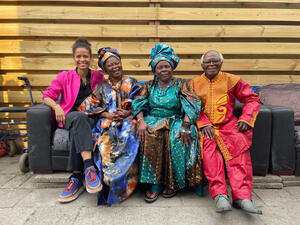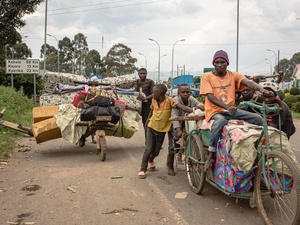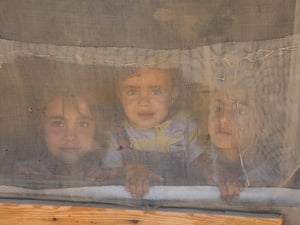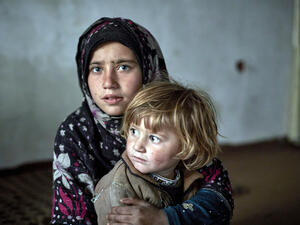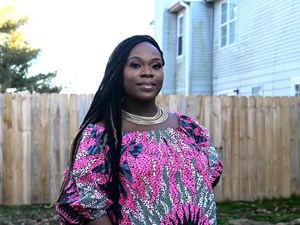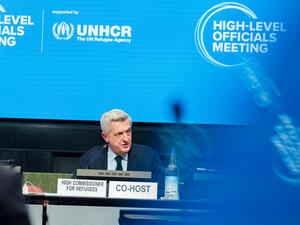Eritreans look ahead to life in resettlement
Eritreans look ahead to life in resettlement

Repatriation is not an option for every Eritrean refugee in Ethiopia's Shimelba camp. Resettlement is an alternative.
ADDIS ABABA, Ethiopia, April 6 (UNHCR) - For many Africans, a one-way ticket to a beautiful, peaceful and prosperous country like New Zealand would be a dream come true.
Even though that's the prospect facing Eritrean refugee Oumer Abdelawel after two-and-a-half years in an Ethiopian refugee camp, he's feeling ambivalent about leaving his homeland forever: "For me it's a choice between bad and worse. And it's only natural that I go for the bad."
The 35-year-old former journalist was one of 10 Eritrean refugees from Shimelba camp in northern Ethiopia who recently boarded a flight from Addis Ababa to New Zealand, where the UN refugee agency has arranged for him to be resettled.
"For someone from a poor country like Eritrea, New Zealand looks like an economic paradise," he concedes. "But economic well-being is not everything. It does not always guarantee inner fulfilment." What concerns him most is that it will be nearly impossible to resume his career as a journalist in a foreign country and a foreign language.
"The further I go from home, the more my cherished dream of growing as a professional journalist withers away," he says grimly.
Like most refugees anywhere in the world, what he'd most like is to go home. "If there were any prospects of going home in the near future, I would prefer staying some more time in the camp to resettlement," adds Oumer.
However, going home does not look possible any time soon. Oumer was working as a reporter for a private newspaper in the Eritrean capital, Asmara, in September 2001, when the government shut down all private newspapers and imprisoned a number of journalists.
Paris-based Reporters without Borders has called Eritrea "Africa's largest prison for journalists," and says it is among the five worst countries in the world for media repression.
Oumer fled to Sudan that September to avoid the press crackdown, and made his way to Ethiopia's Shimelba camp a year later. Just four months ago he married an Ethiopian woman, who left with him for New Zealand.
"Of course, UNHCR prefers to help refugees go back to their home countries when they can do so in safety and dignity," said Daniela Cicchella, head of UNHCR's Regional Resettlement Hub in Nairobi. Another lasting solution is sometimes for refugees to settle permanently in their country of asylum.
"However, there are some instances where the only appropriate solution to a particular refugee's plight is resettlement in a third country," she added.
New Zealand is one of the 17 resettlement countries working with UNHCR. The others are Argentina, Australia, Benin, Brazil, Burkina Faso, Canada, Chile, Denmark, Finland, Iceland, Ireland, the Netherlands, Norway, Sweden, the United Kingdom and the United States. Last year UNHCR helped 700 refugees who had found asylum in Ethiopia to resettle in third countries, said Ita Schuette, UNHCR's Resettlement Officer in Addis Ababa.
Just before Oumer's group departed, Izabella Aron and 34 other Eritrean refugees from Shimelba left for resettlement in the United States. But she certainly didn't share Oumer's qualms about a new country. In fact, she was overjoyed.
"What I call home is where I can live in dignity and prosperity, and I have every reason to celebrate this special opportunity," said the 45-year-old mother of seven, smiling broadly. As a member of the Kunama group in Eritrea, she said she was deprived of her dignity and prosperity.
"Back in 1991 when Eritrea was 'liberated', the new government harassed me and imprisoned me for seven months for the simple reasons that I have a minority ethnic background and that I was married to a former Ethiopian soldier," said Izabella. That experience and a fear of further persecution caused her to flee Eritrea in 1992. (Eritrea won its war of independence from Ethiopia in 1993, but the two former enemies are still engaged in a border dispute.)
So desperate was Izabella to flee, that she managed to bring with her only two of her children - a son and a daughter - and had to leave the other five children behind.
"My biggest dream is that when I get to the United States, I will start working to get my children back and reunite the family," she said as she packed her meagre belongings into a new suitcase in a small Addis Ababa hotel just before leaving with her son, daughter and niece.
Going with them on the same flight was Haile-Mariam Kahsay, a 28-year-old former university student from Eritrea who has been a refugee in Shimelba camp since February 2003.
"I've always wanted to visit the United States of America, but I didn't want to go there as a refugee," he said. Now he plans to seize the opportunity to complete his biology studies "and climb up the academic ladder."
Resettlement in the US is also, for Haile-Mariam, "something of a liberation from the realities" of camp life. "This was actually the first time I was out of my country and I found camp life to be very tough," he explained.
"For me, living in a camp means living on very limited resources and with your freedom of movement curtailed." Life in the US, he is convinced, will be a total contrast. "The most sacred thing I am looking forward to enjoying in the US is the freedom there," he said with a confident smile.
By Kisut Gebre Egziabher
UNHCR Regional Liaison Office, Addis Ababa, Ethiopia



